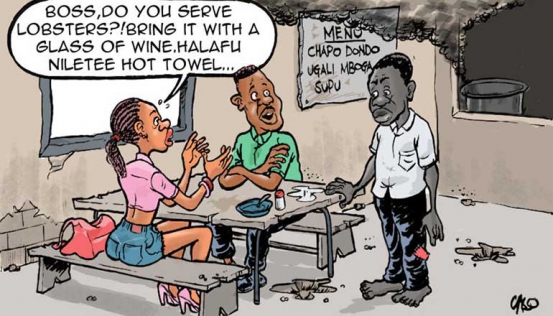
As the festive season comes to a close, one would expect villagers and their urban-based relative to be happy with each other, after spending time together, celebrating and feasting.
That, however, is not the case. Furious villagers are crying foul, accusing their urban folks of being guests from hell. A closer scrutiny of social media posts and conversations with villagers says it all.
From those annoying types who insisted on quoting William Shakespeare and other philosophers like Socrates and Plato to villagers during conversations; to those who insisted on speaking English and Swahili to their village-mates who only understand mother tongue.
Or those randy urbane men who ‘confused’ and messed up with village girls and even married women, as they showed off hired cars.
Cartoonist Nanjero fired the first salvo, accusing some city residents of engaging in what he called “robbery without violence” in their respective villages.
“Shame on you who came to shags with only two packets of baking floor, a sachet of salts and two litres of cooking oil, but left with a sack of 90kg maize, a 40kgs sack full of beans, four hens, a sack full of potatoes and millet and left your hosts with only sh500 token. You are thieves,” he joked.
“Phew! Good riddance! Thank God city people have left,” hisses Sophia Wamukoya, complaining that having his Nakuru-based niece around was such a big scandal.
“Each and every time she stepped out, her dress code scandalised the entire clan,” she scoffs. Wamukoya says his niece — forgetting that she was living in a conservative and primitive village where women in very high heels, too much lipstick and scanty dress code are mistaken for harlots — would step out in a skirt so tinny like a handkerchief, leaving acres and acres of her thighs exposed.
“Some villagers were confusing her with a prostitute, soiling the good name of our family and clan at large.”
What’s more, she says her niece’s laziness was legendary. “She would wake up at midday and refuse to assist with household chores, fearing that her nail polish would chip off,” Wamukoya agonises.
Peter Chetambe from Kitale says a friend who left the village and has been in Nairobi for only two years came back and refused to eat using his hands.
“He would demand a fork, knife and other strange things like serviette or hot towels, something we found weird,” he says.
Chetambe adds that children to some of his urbane relatives poked fun at their grandmother for eating termites, which is a delicacy in the locale.
“They insinuated that she was a mad woman and even refused to shake her hand. Her wrinkled skin became a talking point. They ridiculed her, claiming she was so wrinkled that she resembled an old monkey,” he agonises.
Choosy drama queens
Jacob Makokha told this writer of a city-based relative who visited their Mumias base and refused to drink water drawn from the river like everyone else.
“First time she was served drinking water, the drama queen suspiciously stared at it like a scientist studying a specimen. She then asked the source and whether it had been disinfected. She turned it down and demanded bottled water,” recalls Makokha.
Makokha felt piqued that even after bottled water was brought from nearby shopping centre, the girl still questioned the company that manufactured it.
“Which company bottled this water? I have never heard of it. Is it safe?” She is quoted to have asked, at the chagrin of her hosts who were now seething with rage
In local village pubs, Alfred Kizito says, locals were treated badly, with waiters giving preferential treatment to visiting urbane people. Jackson Okwemba cried on facebook: “At least, barmaids will now serve and give us seats instead of beer or soda crates to sit on.”
Some urban folks are also accused of buying villagers cheap liquor like chang’aa, busaa and wines and spirits, only to travel to nearby towns to treat themselves to quality brands. And some, we were told, were just ill-mannered types who showed off to pub owners without buying anything.
“Imagine town people asking Johnnie Walker gold reserve label? Or a bottle of wine at a village local pub? Others would shamelessly ask barmaid for ice-cold drinks or ice cubes, yet they know too well these villages are not connected with electricity.
Others indirectly mocked villagers by asking silly questions like, “any nearest massage parlor around here” and laughed at the ignorance of clueless ones, yet when they knew such sophistication is yet to get to the villages.
A story was told of a man in Maseno, whose two children refused to enter his grass-thatched house, fearing that it could catch fire and burn them anytime, especially at night while they slept.
Others are so sly and inconsiderate that after blowing up their cash, they began nagging their rural folks to fundraise to get them bus fare back to their urban homes.
 The Standard Group Plc is a multi-media organization with investments in media
platforms spanning newspaper print
operations, television, radio broadcasting, digital and online services. The
Standard Group is recognized as a
leading multi-media house in Kenya with a key influence in matters of national and
international interest.
The Standard Group Plc is a multi-media organization with investments in media
platforms spanning newspaper print
operations, television, radio broadcasting, digital and online services. The
Standard Group is recognized as a
leading multi-media house in Kenya with a key influence in matters of national and
international interest.









